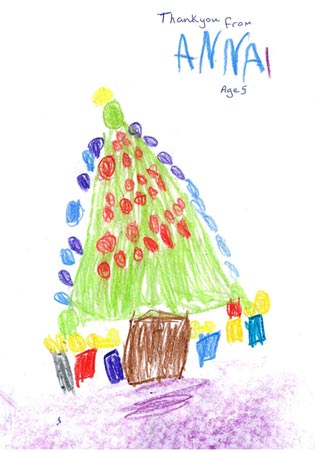当前位置: Language Tips> 英语学习专栏
要分别了,懵懂的孙子像往常一样无忧无虑,而孤独的老人忧心忡忡。终究还是不能避免离别时的伤心不舍和分别后的牵肠挂肚,老人担心距离会让孩子把自己淡忘,毕竟他还只是个蹒跚学步的两岁孩童。然而,孩子并没有忘记,在遥远的电话那头清晰地喊着:“奶奶……”

阑珊 选 曹旭丹 译
|
“I will miss you very much when you leave.” I muttered to hide the catch in my voice. Thirty-month-old Andy leaned across my living-room rug and handed me a green, plastic suitcase no larger than a walnut and asked, “Will you come to visit?” “Of course,” I said with as confident a tone as I could muster over the lump in my throat. “I’ll do what I can to keep our connection alive,” I thought, “but you’re so young, you’ll forget me in no time.” It was the last afternoon in my year of taking care of my grandson three afternoons a week. We filled his mother’s old, red-plastic circus train with the giraffe, elephant, and monkeys and pushed them under the footstool. We pretended they were moving to Michigan[2] next week, too. Then we went on our usual amble[3] up the block. He stopped along the way to poke rocks with a stick and pick up leaves. “Here, Nana. This is for you,” he beamed, and offered me an apple leaf and a piece of gravel. I stuffed them into the pocket of my jeans, a precious hoard[4] against the coming drought of our separation. On our way home, we checked the fences in vain for his favorite neighborhood cat, an albino named Captain Marvel. Andy galloped[5] past me, arms out-stretched into the breeze, mane[6] flying. Then he stopped, grabbed the leg of my jeans, and kissed my knee. A tidal wave of pleasure washed over me. I floated along the sidewalk. Then Andy looked up at the 39 front stairs winding through my terraced garden, threw up his arms, and announced that he was too tired, “Nana. Carry me.” I sat down on the first step. “You know I can’t do that. We’ll have to go up on our bottoms.” He settled beside me on the cold stone and laughed as we plopped our way up past the daisies, one step at a time. At step No. 10, he stood to reach one of the “hats” he likes to pull off the poppy buds and, mindless of his being too tired, scrambled the rest of the way to the front door. Stupefied[7] from the effort of slowing down to toddler time, I sank onto the living-room floor and lay on my back—a desert traveler buried in sand. He flung himself on my chest, pried up my eyelids, and shouted, “Nana, let’s go rake the yard!” “You’re going to miss this. You really are,” I thought, as I yanked[8] myself back into action. On the last day that I picked him up from nursery school, he walked toward me with downcast eyes and a secret smile. Then, like a magician revealing a magic coin, he opened his fist and reached up with a necklace made of bits of dried pasta[9] and orange and green plastic beads. “For Mommy?” I asked. “No, Nana. It’s for you!” Now he had me whirling on the ballroom floor. He’d been gone a week. The empty white shelves where he kept the miniature train and airport and cash register stared at me in the hall—a reminder of the emptiness I felt. I had thought I would enjoy my freedom to rush right through my “to do” list without a pause—no lying about on the rug. But even when I managed to go all the way until lunchtime without thinking of him, I was not consoled. My nightstand held the valentine he’d made me—two pages of red construction paper stapled together at the top, covered with misshapen color—marker circles and big black dots. Whenever I worried that our connection might be fading, I opened the drawer and felt his energy flutter up around me like a freed canary[10]. Late one rainy afternoon, pinched[11] by the unavoidable, I sat at my desk paying bills. The phone rang, I grabbed the receiver and wanted to shout, “Will you leave me alone so I can finish one thing!” but I hesitated. All I heard was silence—maybe one of those automated phone calls gone bad. Then I heard some garbled[12] mumbling. “That’s not English; it must be a wrong number,” I thought, and I reached over to hang up the receiver. Then Andy’s clear treble boomed, “Nana!” My heart burst at the sound of his dear, familiar voice. I heard his amazement, “I pushed the buttons, and there you are!” I could almost see his blue eyes widening, and the golden froth of hair on his forehead, smell his teddy-bear scent, and feel his plump fingers snug around my thin ones. Thank goodness for the telephone, I thought as we exchanged pretend hugs through the wires. Then I hung up and smiled as I turned back to my desk. I hadn’t lost him after all. |
“你走后,我会非常想你的,”我小声说,想掩住嗓音里的哽塞。 30个月大的安迪斜倚在我起居室的小地毯上,递给我一个还没有核桃大的绿色塑料手提箱,问道:“你会来看我吗?” “当然了,”我克制住喉咙的哽咽,用尽量坚定的语气说道。 “我会尽我所能跟你保持联系,”我心想,“但是,你还这么小,很快就会把我忘记了。” 那年我每周可以照看孙子三个下午,这是最后一个下午。我们在他妈妈的那辆陈旧的、红色塑料的环形火车里塞满长颈鹿、大象和猴子等玩具,然后把它们推到脚凳底下,假装它们下周也会跟他一起去密歇根。 随后我们像往常一样到街上散步。他沿着路边走边停,用棍子戳石头或拾起落叶。 “过来,奶奶!这个是给你的。”他微笑着递给我一片苹果树叶子和一粒石子。我把它们装进牛仔裤口袋里,作为一份珍贵的收藏品,因为分别后我即将一无所有。 在回家的路上,我们徒劳地在栅栏周围寻找他最喜欢的那只邻居家的猫,它是一只名叫“奇迹船长”的患了白化病的小猫。 安迪像匹马一样飞跑着超过了我,他伸出双臂在风中挥舞,头发随风飞扬。随后他停了下来,抓住我的牛仔裤,亲我的膝盖。一阵喜悦的浪潮涌来,传遍我的全身,我飘飘然地走在人行道上。 后来安迪抬头看到从我那梯台式花园里蜿蜒而过的39级前门台阶,他抬起胳膊,说他太累了:“奶奶,抱我。” 我在第一级台阶上坐下来,说:“你知道我不能这么做。我们都得用自己的脚走上去。” 他挨着我坐在冰凉的石头上。后来,当我们从雏菊间穿过,向上扑通一下前进时他就哈哈大笑,每次爬一个台阶。 爬到第十级台阶时,他站住,伸手去够一种他平时就喜欢摘的窑粟花蕾上的“帽子”,于是不记得他所说的太累了,一口气爬完剩下的台阶,直到前门。 努力放慢速度和一个蹒跚学步的孩子同步,这让我疲惫不堪,我倒在起居室的地板上,仰面躺了下来——如同一个埋在沙子里的沙漠旅行者。 他扑进我怀里,掀开我的眼皮,嚷道:“奶奶,咱们去打扫院子吧! “你会想念这事的,你真的会。” 我一边这样想着,一边猛力起身重新开始活动。 最后一天,我到托儿所接他,他低垂着眼睛向我走过来,脸上带着一丝神秘的笑。然后,像魔术师变出魔术币一样,他张开拳头,伸到我面前,原来是一串用干意大利粉面团和橙色、绿色的塑料珠子做成的项链。 “给妈妈的?”我问。 “不是,奶奶。这是给你的!”他让我觉得我正在舞厅的地板上旋转。 他已经走了一星期了。他用来存放小火车、飞机场和收银机的白色架子们空空如也,它们在大厅里盯着我,提醒我他走后我内心的空虚。 我曾以为我会享受我的自由,按我安排的“待办事项”清单忙碌不堪,不会躺在地垫上无所事事。但是,即使我在午饭前忙个不停,努力让自己不去想他,我还是没有得到丝毫安慰。 我的床头柜里有他情人节时给我制作的礼物——两张顶部订在一起的红色图画纸,上边用彩笔涂满奇形怪状的圈圈和大黑点。每当我担心我们的关系可能正在淡漠的时候,我就打开抽屉,会感到他的活力像自由的金丝雀儿一样在我周围飞舞。 一个下雨的午后,接近傍晚时,我因为一些必须要做的事情而烦闷不堪,坐在桌边支付账单。电话响了,我抓起听筒想大叫:“能不能别打扰我,让我好好做完一件事!”但是,我犹豫了。 我听到的只有沉默——可能是哪部自动电话出了故障。然后我听到些含含糊糊的咕哝声。 “这不是英语。肯定是拨错号码了。”我心想,于是伸手去挂听筒。 这时,传来了安迪清晰响亮的叫声:“奶奶!” 听到他亲切熟悉的声音,我的心开始怦怦跳。 我听出他的惊讶:“我按了几个按钮,就真找到你啦!”我几乎能看到他睁大的蓝色眼睛和贴在前额泡沫一样的金黄头发,闻到他身上泰迪熊的香味,感到他胖乎乎的手指蜷在我干瘦的手指里。 当我们通过电话线假装互相拥抱的时候,我心想:真是感谢这部电话!挂断电话,我微笑着回身到桌旁。我终究没有失去他。 (来源:英语学习杂志 编辑:中国日报网英语点津 陈丹妮) |
|
Vocabulary: 1. go the distance: 自始至终,坚持到底。 2. Michigan: (国家)密歇根。 3. amble: 漫步,徐步。 4. hoard: 储藏,积存。 5. gallop: (马等的)飞跑,奔驰。 6. mane: (马等的)鬃;(人的)长发。 7. stupefy: (尤用于被动语态)使(某人)神志不清或失去知觉。 8. yank: 猛拉(某物)。 9. pasta: 意大利面食(如通心粉、细面条、方形饺)。 10. canary: 金丝雀。 11. pinched: (因某事)受罪的,痛苦的。 12. garbled: (指信息)混乱的,含糊的,引起误解的。 |
上一篇 : 音乐往事:遥遥无期的狂想曲
下一篇 : 如何与小女孩儿谈话
电话:8610-84883645
传真:8610-84883500
Email: languagetips@chinadaily.com.cn